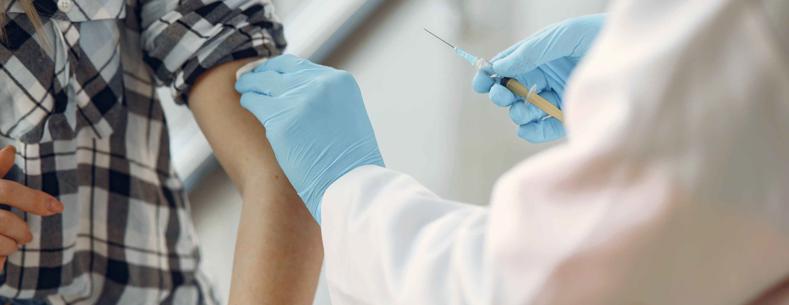Vaccination is widely regarded as a cornerstone of public health. Starting with the smallpox vaccine, developed as early as the 15th century, we now have vaccines for over 20 life-threatening diseases.
In Wales, routine childhood vaccinations aim to protect against illnesses such as polio, diphtheria, meningitis B and rotavirus. This article examines trends in vaccine uptake in Wales, focusing on measles.
Vaccine Coverage in Wales
Public Health Wales (PHW) monitors vaccine uptake through the COVER (Coverage of Vaccination Evaluation Rapidly) programme. The World Health Organisation (WHO) sets a target of 95% vaccine coverage to maintain population or ‘herd’ immunity.
However PHW’s 2023/24 annual report shows this target was achieved for only one vaccine in Wales: the pneumococcal vaccine (PCV) in one year olds, with a 96.0% uptake. The report highlights that only 84.3% of children were up to date with their vaccinations by the age of four.
When vaccine coverage falls below the target, communities face an increased risk of disease outbreak, which can particularly endanger children too young to be vaccinated and individuals with compromised immune systems.
Vaccine uptake: Measles
Measles is a disease that was once common across the world. In 1963, the first measles vaccine was licenced. In 1971, it was combined with mumps and rubella vaccines to make the two-dose MMR vaccine. Achieving at least 95% coverage is essential for community protection against this highly contagious disease.
In 1998, the now discredited study that falsely linked the MMR vaccine to autism contributed to a decline in vaccination rates in many high-income countries. Despite setbacks, the UK achieved measles elimination status in 2016, based on data from 2014 to 2016. Unfortunately, this status was lost by 2018 due to the reintroduction of the virus, driven partly by large outbreaks in other countries, including in Europe.
The global COVID-19 restrictions temporarily reduced measles transmission, with Wales reporting zero cases between 2020 and 2022. The UK regained its measles elimination status in 2021 but as restrictions eased, measles cases are now on the rise.
Wales recorded nine cases in 2023 and 17 in the first 7 months of 2024, predominantly in children aged four or younger. Declining vaccination coverage during the pandemic, in Europe and globally, is a major contributing factor.
The 2023/2024 COVER report shows the MMR vaccine uptake in Wales remains below the 95% target. Uptake among teenagers turning 15 and 16 during the 2023/2024 school year was slightly higher at 91.8% and 91.6% respectively.
In the most recent quarter of the COVER report (April to June 2024) there has been increases in MMR uptake in all age groups, but remaining below the 95% coverage needed.
Inequality and vaccine uptake
There are statistically significant differences in vaccine uptake between the most and least deprived areas of Wales. As a general trend, the higher the level of inequality, the lower the uptake of childhood vaccinations. In all ages bar one-year-olds, the difference in uptake by inequality gap has either remained stable or increased from 2021-22 to 2022-23.
Vaccine uptake also differs by health board, leading to pockets where the chance of a disease breakout is much higher. The most recent COVER quarterly highlights the differences between the health boards in Wales. Powys Teaching Health Board has achieved the highest uptake of vaccines in children by their fourth birthday between January 2023 to June 2024, with an average of 91.5%. Over the same time period, the 95% target was reached only once in Wales (by Powys Teaching Health Board).
Welsh Government initiatives and response
In response to declining vaccination rates, the Welsh Government published the National Immunisation Framework for Wales in 2022. The framework outlines six areas of focus, including improving vaccination equity, streamlining deployment and restructuring governance.
Following an outbreak of measles in Cardiff in December 2023, the Welsh Government emphasised the importance of vaccination, reminding all health professionals to ensure they are vaccinated against measles.
In February 2024, the Chief Medical Officer for Wales, Sir Frank Atherton, urged parents to ensure their children have the full MMR vaccination course. He reiterated that:
“Babies under the age of one, cannot receive the vaccine. It is therefore essential that all those who are eligible, are fully vaccinated. This will help stop the spread of measles and will help protect our youngest children.”
The Deputy Chief Medical Officer, Dr Chris Jones called for immediate action by all health boards to ensure at least 90% of students in Wales are fully vaccinated against measles by July 2024. He warned that unvaccinated individuals may need to isolate for up to 21 days during outbreaks to prevent further disease spread.
Targeting disease elimination
Missing vaccination targets increases the risk of preventable diseases causing severe complications or fatalities, particularly for the most vulnerable. Achieving 95% coverage could eliminate many of these diseases in Wales. Continued efforts to address inequalities, improve access and build public trust in vaccination will be crucial in safeguarding public health.
Article by Mischa Emery, Senedd Research, Welsh Parliament
Senedd Research acknowledges the parliamentary fellowship provided to Mischa Emery by the Medical Research Council which enabled this research article to be complete






